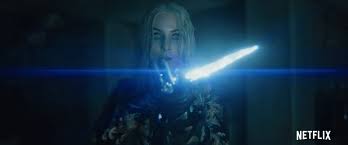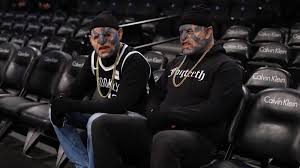A lot of people, myself included, were extremely excited when the trailer for Netflix’s new movie, Bright, dropped. Gritty, urban fantasy with Will Smith? It was the perfect thing to kickstart a genre that has historically been poorly represented on screen. Instead of a deep and interesting take on both the buddy cop and fantasy genres, we got a cookie cutter, sub-Michael Bay mess of a cop movie with the trappings of urban fantasy shoddily welded to it in order to cover for how blatantly the movie rips off of Training Day and Bad Boys. All in order to make a ham-fisted racial metaphor that fails thanks to two boring white guys’s complete inability to understand any sort of racial, sexual, or gender minority.
But it wasn’t NECESSARILY all bad.
The Good Stuff
Nick Jakoby: Orcish Cinnamon Roll

The world seems to go out of its way to make every person in its version of LA deeply unpleasant, but the one exception to this is Nick. Joel Edgerton captures perfectly the balance of sweetness, naivety, and fear that sets Nick apart from his partner, his colleagues, and his species. He composts, he listens to love songs, and he genuinely cares about the people around him. He acts as the films heart, the only true moral compass even as the world seems to go to shit around him. A mistake the film made, I think, was not centering the film around him in the first place. As much as the film wants it to be Ward’s story, it’s really always Nick’s.
Beautiful Filmmaking

Credit where credit is due, the movie looks absolutely gorgeous. David Ayer, Cinematographer Roman Vasyanov and Editor Michale Tronick did a good job at capturing the feel of classic cop movies, from frenetic action to wide-sweeping shots of LA. Some shots transcend their functional purpose: a scene where Ward drops his daughter at his mother-in-law’s house is framed as one single hallway, shot with heavy shadows and not really showing any characters. The movie makes repeated use of dark lighting and shadows which, while not fitting with the tone sometimes, still creates a very visually appealing film.
The Bad Stuff
Fantasy Is Not A Gimmick

As I’ve mentioned, this movie stood out at first glance. To see any sort of fantasy on screen, especially an original attempt like this, is incredibly refreshing. The hope for this film was, and for some still is, that it will prove that urban fantasy is a popular genre and should be produced more frequently. Sadly, Bright is not the vanguard of a fantasy revolution. Instead of telling a fantasy story in a modern settin, Bright has chosen to tell a basic cop story that uses lazy fantasy writing to make it “unique.” All of the fantasy elements are extremely shallow: The dark lord(who is LITERALLY just called The Dark Lord) who will return due to an ooky spooky ritual unless the chosen one stops him. Where have we heard that before? This story could 100% happen with none of the fantasy elements in it. That’s how poorly done the fantasy is, how lazy it is in execution. And that leads into my next point.
Worldbuilding Without The Building

So, to the film’s credit, there isn’t a huge info dump at any point that explains everything to us. Most fantasy is starting to move away from that in favor of organic reveals. But a story needs to make the reader want to learn about the world, to care. In a real world setting like this, we’re wondering what a world is like with real magic and elves. As it turns out, it’s basically the same.
LA is still LA, the United States is the United States. Joe Rogan has a shitty podcast and people use iPhones and laptops. Language is the same, except people can learn at least elvish and orcish in schools. The Alamo was still the Alamo. Elves run stuff, apparently, but that just means they live isolated and aloof. And it’s not even hidden, people KNOW elves run things. But if elves run things, why is the government and everything identical? Why are we America when elves run things? Why is there no one world elven order?
Despite vague references to the “great battle” between the 9 races (of which we see 3 and hear of a fourth), that battle had no effect on the story but to explain the prophecy and to give people a reason to hate orcs. Plus the time frame is so violently off here. The “Great Battle” happened 2,000 years ago. In a fantasy setting the 2,000 years may be a longer time. But in the modern day we can read books on life back then, we can see pictures, we can hold artifact; all from that time. How did the presence of magic and orcs and elves do nothing for human history, and how can a battle that happened the same time Jesus was around be so important? And why should we care if the dark lord returns, when the last time he showed up literally nothing about human history changed.
They don’t even commit to any biology work with the other races. Orcs are tough and strong, elves are strong and lithe and magical. But outside of pointy ears and contacts, or some basic makeup for the orcs, they’re just people. It’s really bad with orcs thanks to how much the movie plays up their size and ugliness, when most of them look like bald dudes with big teeth. And they fall into the bad character design trap where the sexual dimorphism of orcs is “big and scary men”and “small and sexy women with tusks.”
It’s ok to have a fantasy story raise questions. But to establish that despite all these differences, the world is the same? It again reeks of laziness. Look at Shadowrun, which people had hoped this would be similar to to, there’s actual work put into how the fantasy stuff would affect the world. There was a point of divergence, the world shifted, humanity had to adapt, the United States collapsed. It’s a different world, one that we see much of ourselves in but also want to know all the differences. In contrast,who gives a shit if the person ordering an uber just happens to have sharp ears?
Can’t Crack The Code

There is no way in hell that a movie, made by two privileged white dudes under the name “Trigger Warning Entertainment,” was going to capture any sort of sense of the African-American, Latinx, or really any oppressed persons experience (they consider a “kick me sign” to be an example of minority oppression within a police force) . And they don’t, thanks to their fundamental misunderstanding of racial coding.
From the get-go, the orcs are positioned to stand in as a metaphor for black people. But the writers apparently have no idea what black people are actually like outside of stereotypes. How do the orcs dress to let us know they’re this movies black people? Chains, bandanas, sportswear, baggie pants, and hoodies. The stuff some white old person would say “the Gangbangers” wear. The most egregious is putting multiple orcs in durags when orcs don’t even have HAIR! But black men wear them so we better have the orcs wear them! And then they muddle it down by including some elements of Latinx culture as well as making the orcs punks. The orcs are a subculture chameleon. Whatever oppressed group they need to represent for the moment, they represent.
The shallow coding doesn’t extend to Nick, who is by happenstance the most interesting character. Played by a white man and written much more like a white man than the other orcs, we never see him out of uniform or in any way showing signs of the things the writers have attributed to orc culture. They make him well spoken, gentle, a composer who hates rap music. If anything, he represents a racist white person’s “ideal” black person because he looks like the other orcs but acts nothing like them.
The attempts at coding fall further apart when actual minorities show up and act like stereotypes of themselves. Every black person in this movie talks the way a white person thinks a “street” black person might talk, even Will Smith. The only African-Americans we see other than Will are a bunch of dudes sitting on their lawn, drinking, and blasting loud music. Will even calls them “gangsters” and tells them to “crip walk out of here”. The Latinx characters fare worse, with every single one dying and all but one of them being a stereotype of the East L.A gangster. They’re violent, uneducated, rigger happy, and covered in tats and jewelry. The filmmakers try to capture a melting pt of subcultures all colliding, but when they can’t get a single one right it just comes off as worrying.
The movie has an underlying anti-racist message that is undercut by is handling of not just its half-assed allegory, but its depiction of any non-white people as stereotypes.
Other Problems

- There’s are NO female characters in this movie that aren’t bitchy, a plot device, or evil. The elf Tikka is perhaps the worst offender, being Leeloo kicked up to 11. Her only purpose is to be a deus ex machina.
- Margaret Cho appears, playing the corrupt commander who, despite being played by a Korean actress, has a Chinese name. Again, when cultural sensitivity is a theme…follow up on that.
- Landis is still coasting on Chronicle, as the magic in this is just a superpower you get through a genetic lottery.
- The elves have a very strong correlation with Jewish stereotypes: they’re rich, isolated, are purported to run the world, and dress strangely. Considering Landis is Jewish himself, this is either some kind of satire or a blind spot.
- The Dark Lord requiring just three wands to summon is incredibly lame. That’s like saying he can be summoned with three million dollars. Will they be hard to get? Yeah. Will people fight for a million, kill over a million? Yes. But ultimately, is it that hard to get together?
Final Thoughts
As a movie, Bright is a supreme disappointment. It doesn’t get fantasy right, it doesn’t do anything new for the cop genre, and it can’t even keep its metaphor straight. As an allegory for race relations? Its downright insulting. If you want a good cop movie; go watch Training Day or Hot Fuzz. If you want well thought out, interesting urban fantasy; go read Neil Gaiman’s Neverwhere or Jim Butcher’s Dresden Files series. Or go get Shadowrun Returns for your PC, it’s 80% off right now on Steam.

